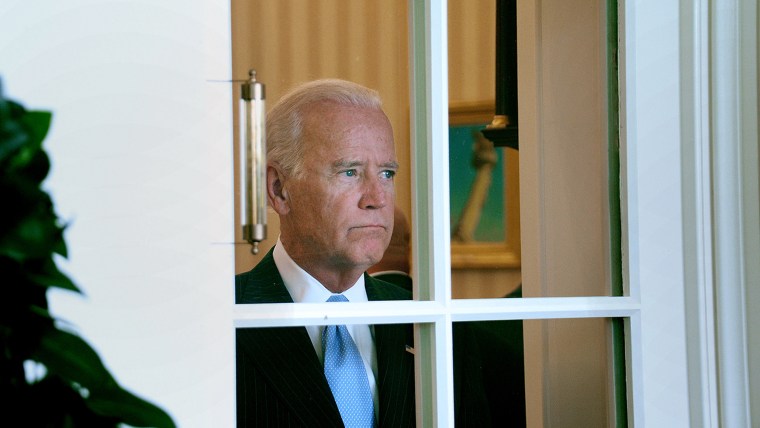
The Washington Post recently published an op-ed purportedly written by President Joe Biden that tried to justify his visit with Saudi Arabian Crown Prince Mohammed bin Salman, the psychopath who ordered the murder, dismemberment and dissolution in acid of Jamal Khashoggi, a columnist for—wait for it—The Washington Post. Let’s hope MbS likes Biden’s “writing” better than Khashoggi’s.
A publication whose motto is that “democracy dies in darkness” probably owes its readers the truth about who writes its articles. There is 1,000,000% no way in hell that Biden wrote that piece. Listen to him talk, then read it, you’ll see. Truth in advertising is important; accurate labeling more so. When I purchase a can labeled carrots, I don’t want to find pigs’ feet inside. Yet many newspaper opinion pieces and books bylined by high-ranking political figures and celebrities, like the piece that got Amber Heard sued, are ghostwritten. These are flagrant violations of journalistic ethical guidelines regarding attribution, a fraud against the readers, propaganda that elevates inarticulate fools into ersatz statesmen, and if editors won’t cut it out Congress should make it illegal.
It is the underlying argument, however, that makes “Why I’m going to Saudi Arabia” interesting. “I know that there are many who disagree with my decision to travel to Saudi Arabia,” “Biden” “writes,” going on to “say” that human rights concerns must take a backseat because the kingdom can help the U.S. “counter Russia’s aggression” in Ukraine, “outcompete China” and serve as a bulwark against Iran.
Even by the standards of the Beltway natsec Blob types whose “Risk” worldview considers countries and governments to be little more than pieces to be shuffled around a gameboard, “Saudi Arabia is a bulwark” is a shibboleth hard to top in its idiocy.
A bulwark?
Against what?
MbS rules the most notoriously barbarous, moronic and viciously violent regime on earth—one that by any metric is far worse than Iran, Russia or China. Torture, arbitrary arrests and political murders are commonplace. “Saudi courts have sentenced people to flogging for extramarital sex, drinking alcohol, and other offenses. While rarely, if ever, carried out, stoning sentences have been issued for adultery. The authorities have used and carried out sentences, albeit rarely, for amputation of limbs for theft,” according to Human Rights Watch. Saudi Arabia executes people, including children, for nonviolent drug offenses as well as witchcraft and sorcery.
In a single day this past March, Saudi Arabia executed 81 people, including non-citizens, for a variety of crimes, including “disrupting the social fabric and national cohesion” and “participating in and inciting sit-ins and protests.”
Saudi Arabia is one of the top destinations in the world for human traffickers, slave labor and sex trafficking.
Saudi women are treated like children under the law by the nation’s male guardianship program. As a result, the kingdom has the lowest female worker participation rate in the world, 5%.
Saudi Arabia finances countless radical Islamic terrorist groups around the world, including those who carried out the 9/11 attacks, and has spent an estimated $100 billion to spread its toxic brand of Wahhabi Muslim extremism to other countries. It has waged a brutal proxy war in neighboring Yemen, creating one of the worst humanitarian disasters on the planet.
The moral bankruptcy of American policy is exposed by the fact that Iran, which we target with sanctions, is a much more pluralistic and secular country than our frenemy Saudi Arabia. Iran has Jewish synagogues, Christian churches and Zoroastrian temples; its parliament has 14 non-Muslim members. Saudi Arabia, where anti-Semitism is widespread, required U.S. soldiers stationed there during the Gulf War to fly to international waters to observe Jewish services.
Iran’s support of international terrorism pales next to the Saudis’.
“For the past few decades,” Omar Bekdash wrote in the Cornell Diplomat in 2019, “women have enjoyed many more rights in Iran than in Saudi Arabia. In Iran, women are allowed to vote in every election and stand as candidates: six percent of Iran’s parliament is comprised of women, which is greater than the rate in cosmopolitan Lebanon, four percent. Women work and open businesses in Iran without the need for male approval—either from their male elders or their husbands.”
Iran has a vibrant opposition press; Saudi Arabia takes a zero-tolerance approach to dissent.
Given the record, it would make much more sense to cozy up to Iran as a bulwark against Saudi Arabia. The truth, of course, is that we have more in common with Saudi Arabia—because they’re the worst.
(Ted Rall (Twitter: @tedrall), the political cartoonist, columnist and graphic novelist, is the author of a new graphic novel about a journalist gone bad, “The Stringer.” Order one today. You can support Ted’s hard-hitting political cartoons and columns and see his work first by sponsoring his work on Patreon.)




